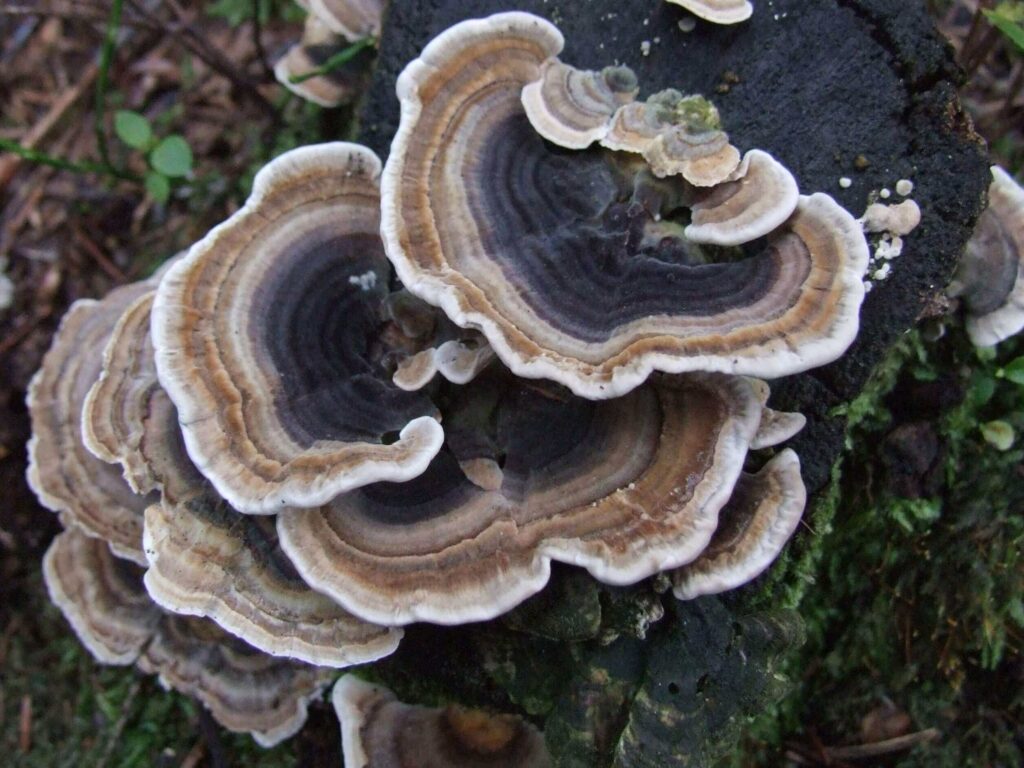The Science: Trametes Versicolor (Turkey Tail)
Coriolus Versicolor, also known as Trametes Versicolor or Polyporus Versicolor, is commonly called Turkey Tail. This mushroom rises from lignocellulosic wastes and has a fan-shaped wavy margin, and may exist in nature in several different colors. Both extracellular and intracellular polysaccharides of C. Versicolor are physiologically active as bioactive compounds. Two polysaccharides, polysaccharopeptide (PSP) and polysaccharopeptide Krestin (PSK), were isolated from C. Versicolor and used as a supplement to support chemotherapy and radiotherapy of cancers due to its immunostimulatory properties. Furthermore, it seems that these polysaccharides may also act as prebiotics by stimulating the growth and activity of probiotic bacteria in the colon. [1-5]
Polysaccharides isolated from C. Versicolor have demonstrated antitumor activity in the past. In vitro studies showed that PSP acts selectively against specific tumor cells. Thus, it has been reported that C. Versicolor extract, at the concentration of 1 mg/mL applied directly in human cancer lines, inhibited their growth, namely gastric cancer, lung cancer, leukemia, and lymphoma. Moreover, PSP is active against Ehrlich ascites carcinoma, sarcoma 180, and leukemia P388. However, not all tumor cells appeared to respond to C. Versicolor polysaccharopeptides [6-9]

These statements have not been evaluated by the FDA. This information is not intended to diagnose, treat, cure or prevent any disease.
MUSHROOM RESEARCH & REFERENCE:
[1] Knežević, Aleksandar, Živković, Lada, Mirjana, Vukojević, … Biljana. (2015, July 14). Antigenotoxic Effect of Trametes spp. Extracts against DNA Damage on Human Peripheral White Blood Cells. Retrieved from https://www.hindawi.com/journals/tswj/2015/146378/
[2] Chen, J., Jin, X., Zhang, L. and Yang, L., “A study on the antioxidant effect of Coriolus versicolor polysaccharide in rat brain tissues,” African Journal of Traditional, Complementary, and Alternative Medicines: AJTCAM/African Networks on Ethnomedicines, 10 (6). 481-484. October 2013.
[3] Jiménez-Medina, E., Berruguilla, E., Romero, I., Algarra, I., Collado, A., Garrido, F. and Garcia-Lora, A., “The immunomodulator PSK induces in vitro cytotoxic activity in tumour cell lines via arrest of cell cycle and induction of apoptosis,” BMC Cancer, 8 (1). 78. January 2008.
[4] Sakamoto, J., Morita, S., Oba, K., Matsui, T., Kobayashi, M., Nakazato, H. and Ohashi, Y., “Efficacy of adjuvant immunochemotherapy with polysaccharide K for patients with curatively resected colorectal cancer: a meta-analysis of centrally randomized controlled clinical trials,” Cancer Immunology, Immunotherapy, 55 (4). 404-411. April 2006.
[5] Yu, Z.-T., Liu, B., Mukherjee, P. and Newburg, D. S., “Trametes versicolor extract modifies human fecal microbiota composition in vitro,” Plant Foods for Human Nutrition, 68 (2). 107-112. June 2013.
[6] Mao, X. W., Archambeau, J. O. and Gridley, D. S., “Immunotherapy with low-dose interleukin-2 and a polysaccharopeptide derived from Coriolus versicolor,” Cancer Biotherapy & Radiopharmaceuticals, 11 (6). 393-403. December 1996
[7] Dong, Y., Yang, M. M.-P., and Kwan, C.-Y., “In vitro inhibition of proliferation of HL-60 cells by tetrandrine and coriolus versicolor peptide derived from Chinese medicinal herbs,” Life Sciences, 60 (8). PL135-PL140. January 1997.
[8] Yang, M. M. P., Chen, Z. and Kwok, J. S. L., “The anti-tumor effect of a small polypeptide from Coriolus versicolor (SPCV),” The American Journal of Chinese Medicine, 20 (3-4). 221-232. January 1992.
[9] Cruz, A., Pimentel, L., Rodríguez-Alcalá, L. M., Fernandes, T., & Pintado, M. (2016, December 8). Health Benefits of Edible Mushrooms Focused on Coriolus versicolor: A Review. Retrieved from http://pubs.sciepub.com/jfnr/4/12/2
